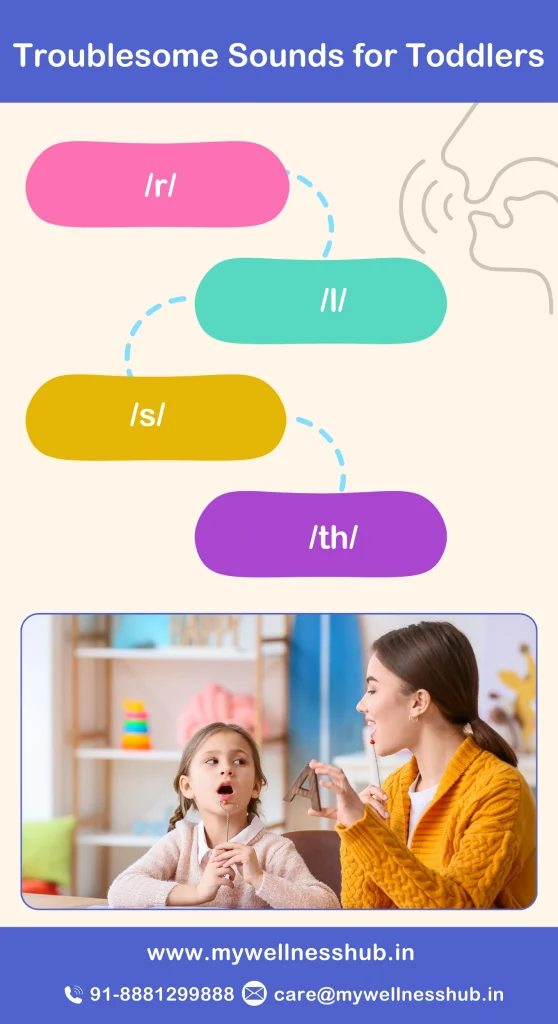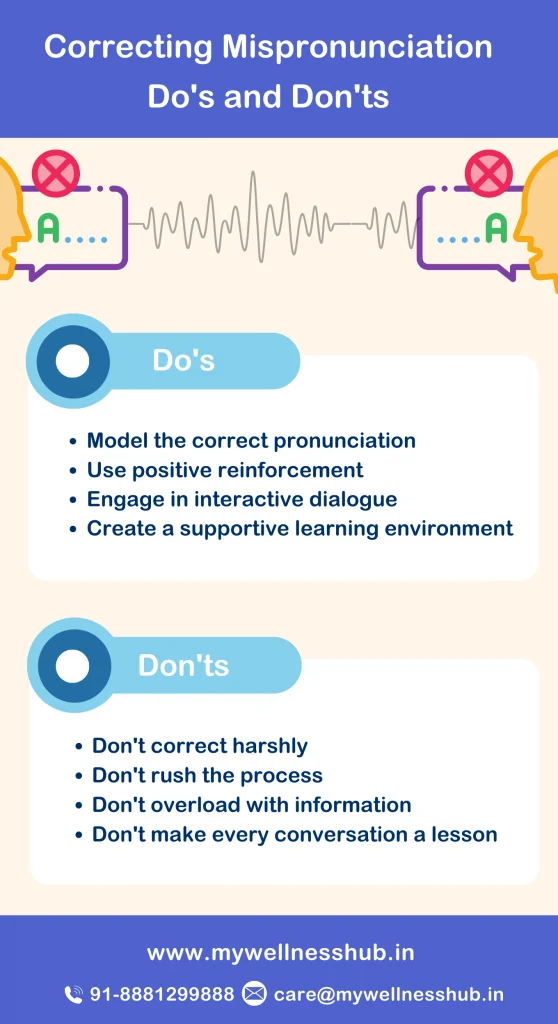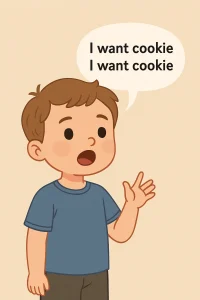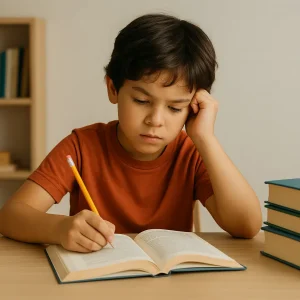Is It Normal for Kids to Mispronounce Words?
By Rajini D
Last Updated: January 10, 2025
It’s natural for young children to struggle with pronunciation as they learn to speak. Mispronouncing words is a typical part of child speech milestones, reflecting normal progress in language skills. While some toddlers master sounds like ‘R’ and ‘S’ early, others take a bit longer. This variation is expected and no cause for worry. Encouragement and patience are key as each child develops at their own pace. Let’s explore how these early experiences shape their communication skills, ensuring they grow confident in their unique voice.
Also read: The Early Years of Speech and Language.
Understanding Speech Development in Children
Key Milestones in Early Speech and Language
Child speech milestones start with babbling, like saying ‘ba’ or ‘da,’ and by their first birthday, most children can say simple words such as ‘mama’ and ‘dada.’ Around age two, they begin combining words, and by age three, they form short sentences, though they might still mispronounce words. These steps are crucial for their future communication skills, and variations in development are normal.
Why Mispronunciation is Part of Normal Development
Child speech milestones often include mispronunciation because their motor skills and mouth structures are still developing, which makes it hard to say some sounds. They learn speech by trying to imitate sounds from their environment, naturally leading to mistakes. This trial and error is a healthy part of learning to speak.
Common Speech Errors in Toddlers
What Sounds Are Hard for Kids to Pronounce?
Toddlers often struggle with several specific sounds as they learn to speak. These include:

- /r/: Known as the “r sound,” it can sound like /w/ in young children (e.g., “wabbit” for “rabbit”).
- /s/ and /z/: These sibilant sounds may be pronounced as /t/ and /d/ (e.g., “dun” for “sun”).
- /l/: Often substituted with /w/ (e.g., “wight” for “light”).
- /th/: This can be challenging, often coming out as /f/ or /d/ (e.g., “fumb” for “thumb”).
Commonly Mispronounced Sounds in Toddlers
| Sound | Common Mispronunciations | Example |
|---|---|---|
| /r/ | /w/ | “wabbit” for “rabbit” |
| /s/, /z/ | /t/, /d/ | “dun” for “sun” |
| /l/ | /w/ | “wight” for “light” |
| /th/ | /f/, /d/ | “fumb” for “thumb” |
Examples of Typical Mispronunciations
Children’s early attempts at speech can lead to adorable and sometimes humorous mispronunciations. Here are a few examples:
- “Pasgetti” instead of “spaghetti”
- “Aminal” instead of “animal”
- “Hewicopter” instead of “helicopter”
- “Nana” instead of “banana”
Also Read: Speech Sound Errors in Children: Milestones and When to Seek Help
When Should Kids Pronounce Words Correctly?
Age-Specific Pronunciation Expectations
Children develop speech at their own pace, but there are general age milestones for pronunciation skills:
Age-Specific Pronunciation Milestones
| Age | Sounds | Example |
|---|---|---|
| By 3 years | p, b, m, h, w | “pie,” “bat,” “mom,” “hat,” “win” |
| By 4 years | k, g, t, d, n | “cat,” “go,” “top,” “dog,” “nose” |
| By 5 years | f, v, s, z, l | “fish,” “van,” “sun,” “zoo,” “lip” |
| By 6 years | sh, ch, j, r, th | “ship,” “chop,” “jug,” “run,” “that” |
Signs of Speech Delays and When to Seek Help
It’s important to monitor your child’s speech development for signs that might indicate a need for professional evaluation:
- Not babbling by 12 months.
- Using fewer than 20 words by 18 months.
- Not using two-word phrases by 24 months.
- Persistent drooling or very unclear speech at 3 years.
know more about our article on Understanding Speech Delay: Causes, Milestones, and Therapy
How to Support Your Child’s Speech Development
Tips for Parents to Aid Speech Clarity
Helping your child speak clearly involves simple, everyday actions. Here’s how you can assist:
- Speak Clearly: Use clear and slow speech when talking to your child to model good pronunciation.
- Read Together: Share books daily to expose your child to new words and sounds.
- Sing and Rhyme: Use songs and rhymes to make learning sounds fun and engaging.
- Correct Gently: If your child says a word incorrectly, repeat it correctly without direct criticism.
- Play Sound Games: Games like ‘I Spy’ can focus on specific sounds that your child finds challenging.
- Encourage Talking: Create plenty of opportunities for your child to talk in a relaxed setting to practice their skills.

When to Consider Speech Therapy
It’s important to know when professional help might be needed:
- Check Milestones: If your child misses key speech milestones, such as not using words by 18 months, consider seeking advice.
- Understandability: If strangers can’t understand your child by age 3, it might be time to consult a speech therapist.
- Observe Frustration: If your child gets upset or avoids talking because they struggle to speak clearly, professional help can make a big difference.
- Notice Stuttering: Ongoing difficulties with stuttering or stammering are signs that a speech-language pathologist should be involved.
Conclusion
Every child’s speech journey is unique, unfolding at their own pace. It’s important to support their development through clear communication, fun reading sessions, and playful learning. If you notice delays, consider speech therapy early on—it can make a big difference. At Wellness Hub, we’re here to help with resources that guide and enhance your child’s speech skills. Let’s work together to ensure your child communicates confidently!
Frequently Asked Questions:
1. When should my child start talking?
Most children begin to babble around 6 months and start forming simple words like “mama” and “dada” by their first birthday. Phrases and more complex speech patterns typically emerge around the age of two. Each child’s development can vary, but these are common benchmarks to watch for.
2. What are common words toddlers mispronounce?
Toddlers often struggle with words that have challenging sound combinations. Common examples include “spaghetti” becoming “pasgetti,” “elephant” turning into “efelant,” and “caterpillar” pronounced as “callipitter.”
3. How can I help my child speak clearly?
Engage regularly in activities that promote speech clarity, such as reading aloud, discussing daily routines, and repeating words correctly without explicitly correcting your child. Encourage them to express themselves and listen attentively when they speak.
4. When should I worry about my child’s speech?
Concerns may arise if your child is not using single words by 16 months or two-word phrases by 24 months. Additionally, if your child shows signs of frustration with their inability to communicate or is largely unintelligible at three years old, consulting a speech therapist might be advisable.
5. What sounds are hardest for toddlers to pronounce?
Sounds like “r,” “l,” “s,” and “th” can be difficult for toddlers. These sounds require more precise tongue placement and air control, which are skills that develop as a child grows.
6. How does reading help my child’s speech development?
Reading aloud exposes children to new vocabulary and sentence structures, enhancing their understanding and use of language. It also introduces rhythm and phonemic awareness, which are foundational for speech clarity.
7. Can singing improve my child’s speech clarity?
Yes, singing can significantly enhance speech clarity. Songs introduce rhythm and repetition, which can help children learn to pronounce difficult syllables and sounds more clearly.
8. What are the signs my child might need speech therapy?
Signs that may indicate the need for speech therapy include a lack of babbling as a baby, not speaking in sentences by age three, persistent drooling or mispronunciation past the expected age, and social withdrawal due to speech difficulties.
9. How do I correct my child’s mispronunciation without discouraging them?
Instead of direct correction, repeat the mispronounced word correctly in a natural conversation. For example, if your child says “wabbit,” you might respond, “Yes, that’s a cute rabbit!” This method reinforces the correct pronunciation subtly and positively.
10. What are fun speech development activities for kids?
Engage in games like “Simon Says,” which encourage careful listening and speaking, practice storytelling or create a family storytime where everyone tells a part of a story, emphasizing clear speech. Additionally, using flashcards with pictures can help children associate objects with their correct names and sounds.
About the Author:
Rajini Darugupally
M.Sc., Speech-Language Pathologist (9+ years of experience)
Rajini is a passionate and dedicated Speech-Language Pathologist with over 9+ years of experience, specializing in both developmental speech and language disorders in children and rehabilitation in adults. Currently, at Wellness Hub, she thrives in a team environment that values innovation, compassion, and achieving results for their clients.
Book your Free Consultation Today
Parent/Caregiver Info:
Client’s Details:
* Error Message








